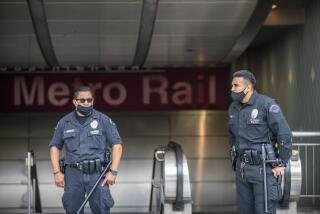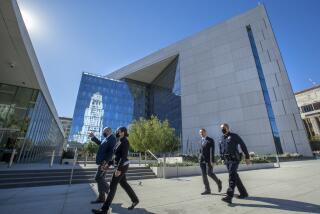Council Backs Pilot Plan for Community Policing : Law enforcement: Program, spurred by Christopher report, will begin at four stations in January.
- Share via
Taking a first step toward overhauling the Los Angeles Police Department, the City Council on Tuesday unanimously endorsed an experimental community-based policing program that emphasizes crime prevention over arrests.
“This is the first major step toward implementation of the recommendations of the Christopher Commission,” said Police Commissioner Jesse Brewer, a former assistant police chief. “Unfortunately, we’re having to do it without additional resources.”
The council did not authorize additional officers or money to pay for the program that will begin at four of the department’s 18 stations in January.
The length of the pilot program has not been determined. Nor has the council set a deadline for deciding whether to expand community-based policing citywide.
However, officials said the pilot program will help determine how many--if any--additional police officers are needed to implement the concept across the city and the cost.
The resolution, approved on a 14-0 vote with Michael Woo absent, was drafted by an ad hoc council committee formed to study the Christopher Commission’s recommendations.
The council voted to ask the Police Commission to work with the department to develop the community-based policing program. Police Commissioners Brewer and Stanley Sheinbaum already have endorsed the program, and it is expected to formally be adopted by the commission.
Council members and police officials said the pilot program could set the stage for a shift from a response-driven department to one that collaborates with the communities it serves--a key recommendation of the Christopher Commission report following the police beating of Rodney G. King.
If successful, “it’s not going to be a pilot program for long,” Police Cmdr. Lawrence Fetters said. “We could take it citywide within six months.”
But it may not be all that simple to sell the program to officers who are used to chasing radio calls and arresting wrongdoers rather than conferring with residents on the best ways to prevent crime in their neighborhood, Brewer said.
Beyond that, Bill Violante, president of the 8,300-member Police Protective League, expressed concern about the viability of launching such a program without allotting funding for additional officers.
“Without more money, how can we implement any additional police programs?” Violante asked. “The city cannot continually ask police officers to do more with less.”
Police Chief Daryl F. Gates told the council that “there can’t be any extra cost” involved in establishing the program because the city faces its worst financial crisis in years.
Police officials are considering the possibility of transferring officers from other stations and specialized units such as narcotics and traffic to help get the pilot program under way. The number of officers needed for the program has not been calculated.
Under the proposal, developed by City Council members Marvin Braude and Mark Ridley-Thomas, the Police Commission and Gates must first select one station from each of the department’s four geographical bureaus to participate in the experiment.
The programs will be tailored to meet the needs of residents but will generally focus accountability on station captains, minimize the creation of specialized units, and assign police officers to small neighborhoods for up to two years.
Community-based policing councils will be created at each station, composed of community and business leaders who volunteer to help police officers identify crime problems and ways to solve them, city officials said.
Quarterly progress reports will be reviewed by the City Council, which will use that information to decide whether to expand the program citywide--which city officials have estimated could cost anywhere from zero to $30 million.
The goal is to have police officers and residents share responsibility in identifying and eliminating community problems, and in developing innovative police tactics.
That is in sharp contrast to the Police Department’s current emphasis on crime control over crime prevention, which the Christopher Commission said has isolated the 8,300-member force from the communities it serves.
Although the department already has installed community policing concepts in the San Fernando Valley and Harbor areas of the city, those programs are not operating under the guidance of the Police Commission and the City Council.
“We believe this (new program) is a mechanism that will release the creative energies of the Police Department,” Braude said. “It will also begin the long process of developing this philosophy throughout the department.”
Warren Christopher, chairman of the independent commission formed to study Police Department practices, agreed, saying, “This is the beginning of a process, not the end; it is an overture, not the final act.”
Nonetheless, Brewer said the programs face significant hurdles.
“The biggest problems I see include getting police officers to accept this new approach to law enforcement, and in getting residents to volunteer in certain areas,” Brewer said.
“Eventually, it is going to cost the city some money because at some point, we are going to have to come back to the City Council and say this is what we need to take it citywide and this is how much we need to do it,” he said.
City Council President John Ferraro warned against expecting too much from what he called “only a demonstration project.”
“We’re feeling our way through this thing,” Ferraro said. “If we find it is working well, we’ll move it up on our list of priorities; if we can find the money, we’ll use it.”
More to Read
Sign up for Essential California
The most important California stories and recommendations in your inbox every morning.
You may occasionally receive promotional content from the Los Angeles Times.











